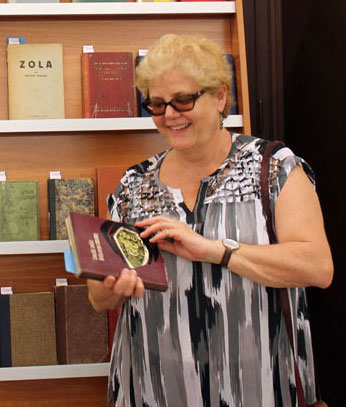Tribute to Dr. Anna Gural-Migdal on her Retirement
06 April 2020
Biography
Born in Fontainebleau (France), Anna Gural-Migdal is Professor Emerita of French Literature and Film in the Department of Modern Languages and Cultural Studies at the University of Alberta. Prior to being hired at U of A, she was Assistant Professor in the Department of French Studies at York University (Toronto, Canada) and Lecturer in the Département de littératures et de langues du monde at the Université de Montréal.
She has published extensively on Émile Zola, naturalism in literature and film, and French cinema. Her main works are Émile Zola et Octave Mirbeau: regards croisés (with Sándor Kálai) (Classiques Garnier, [in print] 2020), L’Écrit-Écran des Rougon-Macquart. Conceptions iconiques et filmiques du roman chez Zola (Presses Universitaires du Septentrion, 2012), Zola et le texte naturaliste en Europe et aux Amériques (with Carolyn Snipes-Hoyt) (Edwin Mellen Press, 2006), Zola and Film. Essays in the Art of Adaptation (with Robert Singer; foreword by Brigitte-Émile Zola) (McFarland, 2005), Writing the Feminine in Zola and Naturalist Fiction (Peter Lang, 2004, 2nd edition), and Le Cinéma de Paul Tana. Parcours critiques (with Filippo Salvatore) (Balzac, 1997). She is completing a monograph titled Naturalisme et horreur dans la fiction d’Octave Mirbeau, to be published with a university press in France.
Prof. Gural-Migdal served as President of the Association Internationale Zola et Naturalisme (AIZEN) and Editor of its SSHRC-funded scholarly journal, Excavatio, from 1999 to 2019. Twenty volumes of Excavatio have been published under her editorial direction. She was also Organizer-in-Chief of fifteen International Conferences on Émile Zola and Naturalism.
Her promotion of Zola and naturalist studies across the world has received major international recognition. In 2013 she was knighted in the Order of the Academic Palms by France’s Minister of Education. In 2017 she was nominated to become a Fellow of the Royal Society of Canada. A book entitled Re-Reading Zola and Worldwide Naturalism: Miscellanies in Honour of Anna Gural-Migdal (eds. Carolyn Snipes-Hoyt, Marie Sophie Armstrong, and Riikka Rossi, Cambridge Scholars Publishing, 2013) was published as a tribute to her research achievements and collaborative spirit.
Anna Gural-Migdal was the recipient of the 2013 University of Alberta Faculty of Arts Undergraduate Teaching Award. In 2015 she was nominated to deliver the University of Alberta Last Lecture. In her nomination, a student wrote: “[Anna] is a fantastic professor. She cares about her students and inspires them to continue discovering the French language outside of class. Her lectures were always captivating and fascinating.”
What has been your favourite class to teach over the years and why?
It was a distinct pleasure to teach French 463: Topics in Nineteenth Century French Literature since this course corresponded to my main area of expertise and gave me the opportunity to dig into masterpieces by Hugo, Balzac, Flaubert, and especially Zola, a brilliant writer whose novelistic work and political thought have had a huge impact across the world. Zola’s novels anticipated a world completely focused on image, while also previewing contemporary issues such as sexual orientation, feminism, and developments in the media and communication.
When I was hired at the University of Alberta in 1996, I created the course FREN 445: Contemporary Cinema in French, which was also a pleasure to teach!
My efforts in offering this course were highly rewarded since students were consistently enthusiastic in their comments about FREN 445. In fact, in my teaching and research I was especially inspired by the connections between literature and film.
What advice would you give to an Assistant Professor just beginning his/her life in academia?
I would advise my young colleague to build a solid academic career by emphasizing research: the most important thing is to develop well-focused research projects with original theoretical frameworks and unique interdisciplinary approaches. Working and publishing at the international level is also essential to becoming a renowned scholar in your field of expertise. What is to be avoided are trendy or fancy research topics that easily become obsolete. When I speak to my students about literature, I explain how important it is to study canonical writers who produced universal masterpieces that never go out of date and can always undergo new analyses and research. Showing students your passion for what you do and what you teach is the best way to be true to them and to yourself.
What are you most looking forward to in retirement?
One of my projects is to finish my book on a writer from the Belle Epoque who was heavily influenced by Emile Zola: Octave Mirbeau. In this monograph, I examine the connection between the radical naturalism of Mirbeau’s novels and the aesthetics of the horror film. Retirement will also give me the opportunity to spend more time with my family in Quebec and Europe. My husband and I are looking forward to enjoying the climate of the French Riviera during the winter.
